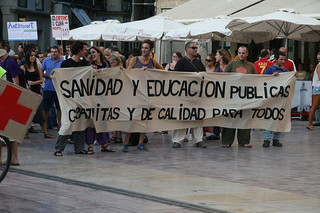U.N. Warns of Social Fall-Out from Spain's Austerity Plan

An expert body of the United Nations has warned the Spanish government that the severe budget cutbacks it is applying must not undermine its commitment to upholding the economic, social and cultural rights of the country's people.
Austerity measures imposed by the government of centre-right Prime Minister Mariano Rajoy could have 'a negative and disproportionate impact on the enjoyment of those rights,' said the United Nations Committee on Economic, Social and Cultural Rights (CESCR).
Committee Chairperson Ariranga Govindasamy Pillay, a native of Mauritius, said these concerns will definitely appear in the final conclusions of its review of Spain's compliance with the provisions of the International Covenant on Economic, Social and Cultural Rights, to be released on May 18.
The Committee, made up of 18 independent experts from different regions of the world, monitors observance of the Covenant by the 160 states that have ratified it since its adoption in 1966 and its entry into force in 1976.
Two particular events mark the case of Spain, which was discussed this week, said expert Jaime Marchán of Ecuador, the Committee's rapporteur on the report presented by Spain.
One was the elections in November last year, won by the People's Party, which replaced the government of the Spanish Socialist Workers' Party (PSOE) led by former prime minister José Luis Rodríguez Zapatero, in power since 2004.
The second feature mentioned by Marchán was 'the persistence of a very severe economic crisis whose direct negative and devastating impacts have often interfered with maintenance of basic levels of protection for economic, social and cultural rights.'
In his assessment of Spain's compliance, the rapporteur recalled that since 2004 the country has taken measures to promote economic, social and cultural rights, adopting many of the recommendations issued by the U.N. Committee in their review of Spain that year. Marchán mentioned the action plan for development of the Roma, or gypsy, population in 2010-2012 and the new 2012-2020 strategy for integration of Roma communities.
However, lawyer Carlos Villán, president of the Spanish Society for International Human Rights Law (AEDIDH), told IPS that in his country, gypsies 'continue to be victims of racism and rejection by a segment of the majority population.'
A member of the Spanish government delegation told the Committee that 52 percent of respondents in a survey said they had 'no or little' empathy for the Roma population. 'We have a lot of work to do,' the delegate admitted.
On the positive side, Marchán noted that Spain had passed legislation on effective equality between men and women and comprehensive protection measures against gender-based violence, and had adopted measures to fight trafficking in persons.
But any favourable impression was undermined by the Spanish government’s responses to questions from Committee experts, and the latest available data.
'The measures adopted so far (by the present government) seem insufficient in the context of the economic crisis to adequately address the provisions of the Covenant for protecting economic, social and cultural rights, particularly for the most vulnerable groups,' the rapporteur said.
Even more worrying was the finding that, as a result of the severe fiscal austerity policies, many of the affirmative measures previously adopted in Spain 'have been reduced or completely eliminated,' Marchán said.
This has led to backsliding in the protection measures concerning the areas covered by the Covenant, he said.
The U.N. Committee experts expressed disappointment at the reduction of the Spanish government's official development assistance, and the rise in unemployment to the unprecedented level of over 24 percent, with youth unemployment at 55 percent.
They also noted the insufficiency of the minimum salary, coupled with cuts in health, education, and social security that have left some groups, such as undocumented immigrants, without any social coverage.
In addition, immigrants are subject to 'xenophobic discourse exacerbated by the crisis,' said Villán.
Marchán pointed to the lack of a specific national plan to combat 'rising levels of poverty, which already affects 22 percent of Spanish households.'
The rapporteur referred in his report to the pernicious effects of the housing bubble, which has increased the number of homeless people.
Villán told IPS that gypsies and immigrants seeking access to housing face many hurdles.
Another expert, Álvaro Tirado from Colombia, referring to the economic and financial crisis rocking Spain and other European countries, complained that when there is an economic bonanza, distribution favours the rich, while in a crisis the burden falls disproportionately on the poor.
Spain is one of the most unequal countries in the European Union in terms of income distribution, he said.
In response to these criticisms, Rafael Barberá of the Spanish employment and social security ministry said his government does not believe the poor should pay for the crisis.
'No one intends that they should bear the burden of the adjustment policies,' he said, going on to defend Rajoy's economic measures on the grounds that 'fiscal consolidation is neither a whim nor an obsession; it is the way forward to ensure that in the near future Spain can begin the process of recovery.'
'Spain does not want the poor to pay the cost of economic adjustment, nor does it want to limit anyone's economic, social and cultural rights. On the contrary, we are convinced that those rights are an important element of development and have a positive long-term impact on growth,' Barberá said.
Committee experts expressed regret that the Rajoy government did not consult Spain's ombudsman when drawing up the report it presented at the current session.
Tirado said they had heard the same complaint from representatives of Spanish NGOs. The NGO representatives said they were confident that the Committee would make stringent recommendations to the Spanish government.
© Inter Press Service (2012) — All Rights ReservedOriginal source: Inter Press Service
 Global Issues
Global Issues